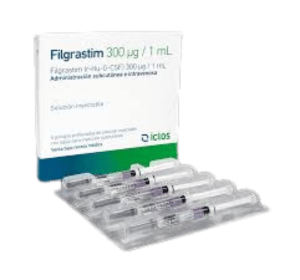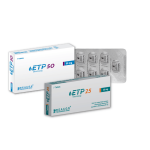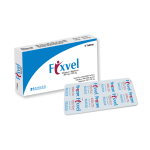Filgrast

Generic Name:Filgrastim
Indications
Filgrast is indicated to those:
- Cancer patients receiving myelosuppressive chemotherapy
- Patients with Acute Myeloid Leukemia receiving induction or consolidation chemotherapy
- Cancer patients receiving bone marrow transplant
- Patients with severe neutropenia
- Peripheral blood progenitor cell collection and therapy
Description
Filgrast is a human granulocyte colony stimulating factor (G-CSF) produced by recombinant DNA technology. G-CSF regulates the production of neutrophils within the bone marrow and affects neutrophil progenitor proliferation, differentiation and enhances phagocytic activity.
Pharmacology
Filgrastim is a granulocyte-colony stimulating factor which binds to cell surface receptors on haemetopoietic cells thus stimulating the development of granulocytes to increase their migration and cytotoxicity.
Filgrastim is a glycoprotein which regulates the production and release of functional neutrophils from the bone marrow. Filgrastim causes marked increases in peripheral blood neutrophil counts within 24 hours, with minor increases in monocytes. Elevations of neutrophil counts are dose-dependent at recommended doses. Following termination of Filgrastim therapy, circulating neutrophil counts decrease by 50% within 1 to 2 days, and to normal levels within 1 to 7 days.
Dosage & Administration
Parenteral-
Chemotherapy-induced neutropenia: 5 mcg/kg daily as a single daily SC inj, as a continuous IV or SC infusion, or as a daily IV infusion over 15-30 minutes, starting not
Bone marrow transplantation: 10 mcg/kg daily by IV infusion over 30 min or 4 hr or continuous IV or SC infusion over 24 hr. Adjust according to response.
Subcutaneous-
Mobilisation of peripheral blood progenitor cells for autologous peripheral blood stem cell transplantation: 10 mcg/kg daily, as a single inj or by continuous infusion, for 4-7 days until the last leucapheresis procedure. If it is given after myelosuppressive chemotherapy: 5 mcg/kg daily by inj; given from the 1st day after chemotherapy completion until expected neutrophil nadir is passed and neutrophil count has returned to normal range, so that leucapheresis can be performed.
Congenital neutropenia: 12 mcg/kg daily in single or divided doses. Adjust according to response. In patients with cyclic or idiopathic neutropenia: 5 mcg/kg daily in single or divided doses. Adjust according to response.
HIV infection and persistent neutropenia: Initially, 1 mcg/kg daily. Dose may be increased to 4 mcg/kg daily until normal neutrophil count is achieved. Maintenance: 300 mcg daily. Max: 4 mcg/kg daily.



